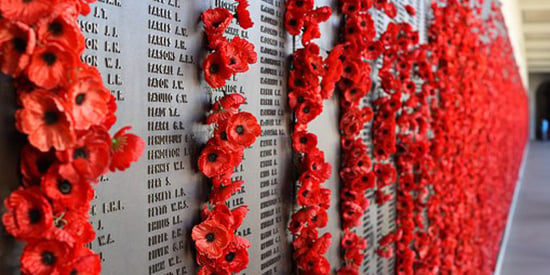We need to commemorate war more maturely says Deakin expert
A Deakin University researcher says it's time Australians started commemorating Remembrance Day more fully and maturely, as the common narrative neglects the suffering of people who were at left at home.
Senior Lecturer in History at Deakin's School of Humanities and Social Sciences Dr Bart Ziino says the mental anguish of living through World War One from afar was once well known, but our understanding of this important element of Australia's war experience has faded.
"The entire focus during the time of battle was on the sacrifice of the soldiers and this, especially for those with loved ones at the front, resulted in those at home carrying an enormous burden of fear and anxiety that was difficult to speak about," Dr Ziino said.
"The signing of the armistice that ended World War One in November 1918 saw Australians flood into the streets in jubilation. But the feelings those people were expressing have long been misunderstood."
Dr Ziino has recently contributed to a new book examining the legacies of World War One. During his research, he was surprised to learn what the public was really saying on November 11, 1918.
"The images from Armistice Day suggest that the jubilation and excitement expressed by Australians was primarily a response to victory and Australia's part in it, but that's not a full reflection of what occurred," he said.
"From the streets all the way to Parliament came heartfelt testimonies not, as one might expect, to the fighting qualities of the ANZACS, but to the relief from the torment and pain that had so defined the war for civilians.
"Australians saw this as a brief opportunity to speak of the extraordinary emotional torment they themselves had endured over the previous four and a half years as they agonised over the fate of loved ones fighting at the battlefronts - as well as fearing the consequences of defeat from home."
Dr Ziino believes this revelation challenges the narrower story constructed around soldiers in World War One and forces Australians to think more broadly about the experience of war on Remembrance Day.
"The declaration of the Armistice briefly permitted widespread and genuine expressions of relief from the torment and pain that had so defined the war for civilians. While the soldiers on the front line struggled, so too did people at home, especially with the anguish and anxiety associated with not knowing," he said.
"For almost four and a half years those left at home while loved ones were at Gallipoli, the Middle East and the Western Front lived in a terrible state of anxiety that was barely spoken about when the fighting was on.
"The emotional trial of Australians not on the front line deserves acknowledgement, if we are to remember the experience of war more fully and maturely."
Dr Ziino is available to comment on the significance of Remembrance Day and why it needs to be commemorated. His areas of expertise include war and commemorations, Australia and World War One, and 20th century Australian history. He has contributed to The Great War: Aftermath and Commemoration, a book examining the short and long-term legacies of the Great War of 1914-18.
The Great War: Aftermath and Commemoration, edited by Carolyn Holbrook and Keir Reeves (UNSW Press), is available from November 11.

